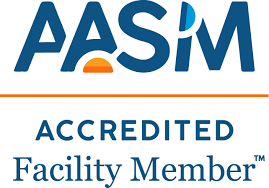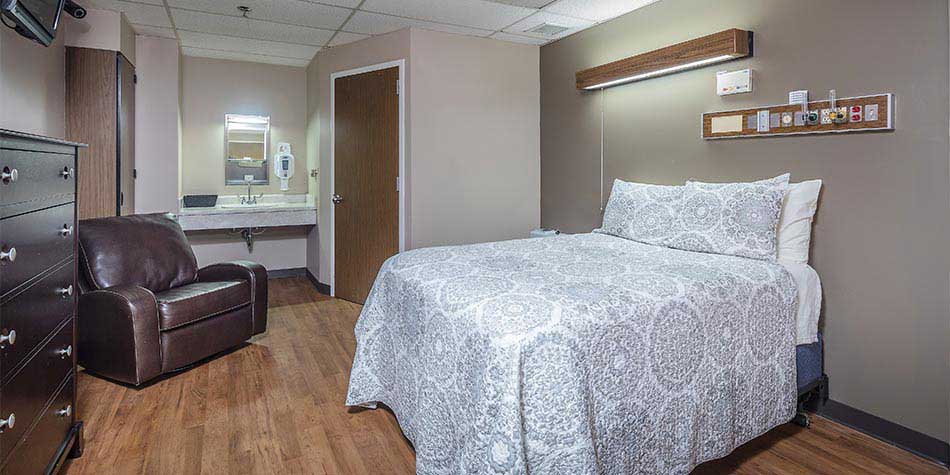Sleep center in Dublin-Laurens County
Important information
We are taking every measure possible to keep our patients safe and healthy during the COVID-19 pandemic. That's why we ask that you wear a mask upon entering the hospital and at registration. From there, you will be taken to a separate, isolated waiting room and then to the sleep lab, which is also isolated from the main patient population.
The Sleep Center at Fairview Park Hospital is here to help identify problems with your sleep, so you can get the good night's rest you need to feel alert and energized throughout the day. Our center is staffed by sleep doctors who analyze your symptoms and sleep problems, often through an overnight sleep study.
If you are looking for more information about The Sleep Center or want to schedule a sleep study, you can call us at (478) 274-3575.
Recognition

The Sleep Center at Fairview Park Hospital is an Accredited Sleep Center Facility recognized by the American Academy of Sleep Medicine (AASM).
Sleep is a vital part of our everyday lives. When something prohibits a good night's sleep from occurring, it may have adverse effects on your overall health. Sleep disorders are linked to numerous health problems, such as:
- Coronary artery disease
- Depression
- Diabetes
- High blood pressure
- Obesity
- Stroke (cerebrovascular accident)
Sleep studies we offer
Our Sleep Center offers a range of diagnostic sleep studies to help us analyze your behavior while you sleep. Once your sleep specialist forms a diagnosis, we work with you to find the best solution for your sleep issues.
Some of the sleep studies we offer include:
Polysomnography (PSG)—A PSG is an overnight diagnostic sleep study performed in a sleep lab to determine the type and severity of your sleep disorder as well as appropriate treatment.
Continuous positive airway pressure (CPAP) titration—This sleep study is used to calibrate a CPAP machine. This in-lab sleep test is typically ordered after you've completed a PSG and have been diagnosed with a breathing disorder, such as sleep apnea.
Multiple sleep latency test (MSLT)—This sleep study, also known as a nap test, is used to measure how quickly you fall asleep in a quiet, dark environment.
What should I expect when I come to a sleep lab?
Before a sleep study is ordered, you'll have a consultation. Then, you'll be sent to a sleep specialist. During your sleep study, you'll be continuously monitored throughout the night so that we can track your sleep patterns.
While our Sleep Center is located in our hospital, there is nothing clinical about the experience. The suites in our lab provide a relaxing setting and offer all the comforts of home.
After your sleep study, your sleep specialist will diagnose your condition. If your sleep disorder requires you to have a CPAP or another treatment, your sleep specialist will guide you through that process.

Learning about sleep disorders
There are many types of disorders that can affect how well you sleep. Sometimes, symptoms such as daytime fatigue and loud snoring can be warning signs for an underlying sleep disorder. When left undiagnosed and untreated, certain sleep disorders can lead to problems, such as loss of sex drive or high blood pressure, that can contribute to stroke and heart attack. Certain symptoms can even result in accidents, such as a car wreck.
If you have a pre-existing heart and/or lung condition and experience poor sleep, you should discuss your symptoms with your doctor. They may suggest a comprehensive evaluation by a board-certified sleep specialist.
At The Sleep Center, we treat a wide range of sleep problems, including insomnia, narcolepsy, periodic limb movements, sleep apnea and a variety of parasomnias.
Insomnia
Insomnia refers to the inability to sleep or inability to remain asleep for a reasonable period of time. People with insomnia—insomniacs—often complain of being unable to close their eyes or rest their mind for more than a few minutes at a time. Common symptoms associated with insomnia include:
- Depression and/or stress
- Disturbing thoughts while trying to fall asleep
- Lying awake for more than half an hour before falling asleep
- Waking during the night and going back to sleep with difficulty
There are two categories of insomnia: organic and non-organic. Organic insomnia is caused by a mental disorder, medical condition or substance use. Non-organic insomnia may be short term and commonly brought on by periods of high stress or long term and typically related to environmental factors.
Insomnia can occur for no apparent reason. However, common causes of insomnia include:
- Certain substances, such as:
- Caffeine
- Herbs
- Medications
- Physical pain
- Psychological factors, such as:
- Anxiety
- Depression
- Fear
- Overactive mind
- Stress
Narcolepsy
Narcolepsy is a sleep disorder that causes an uncontrollable desire to sleep or sudden attacks of sleep during moments of intense emotion. Warning signs of narcolepsy may include:
- A feeling of going limp when angry or surprised
- Cataplexy, which is an episodic condition where muscle function is lost (this ranges from slight weakness to complete body collapse)
- Disturbed or fragmented sleep
- Excessive daytime sleepiness (EDS)
- Paralysis when falling asleep or waking up
- Vivid nightmares or hallucinations when falling asleep or waking up
Parasomnias
A parasomnia is a category of sleep disorder where abnormal behavior occurs during sleep. There are several types of parasomnias, including:
- Movements disorders
- Severe nightmares or tremors
- Sleep terrors
- Sleepwalking or sleep talking
Periodic limb movements
Periodic limb movements (PLM), also called restless legs syndrome, occurs when the muscles in the arms and/or legs involuntary contract during sleep. Symptoms related to PLM may include:
- Crawling sensations in the legs
- Daytime sleepiness
- Kicking at night
- Muscle tension in the legs
Sleep apnea
Everyone may snore occasionally, but persistent snoring can be a symptom of a disorder called sleep apnea. Sleep apnea causes interruptions in breathing during sleep, which frequently wakes people up so breathing can resume. Many people with sleep apnea are unaware of these frequent awakenings during the night.
Due to the restless nature of sleep apnea, people often spend their days feeling tired but don't understand why. Sleep apnea may result in loud snoring, choking and gasping during sleep as breathing becomes more difficult. When left untreated, sleep apnea can cause shortness of breath and chest pain and can even lead to high blood pressure. In severe cases, it can lead to additional health problems, such as heart attack and stroke.
If you are experiencing any of the following symptoms, you may have sleep apnea:
- Feeling sleepy during waking hours
- Loud, habitual snoring
- Observed choking, gasping or holding of breath during sleep
- Waking up tired and/or groggy
If you identify with any of the above, talk with your doctor about your sleep problems and whether a sleep study or sleep apnea test is right for you. Your physician may refer you to one of our sleep apnea doctors at The Sleep Center.